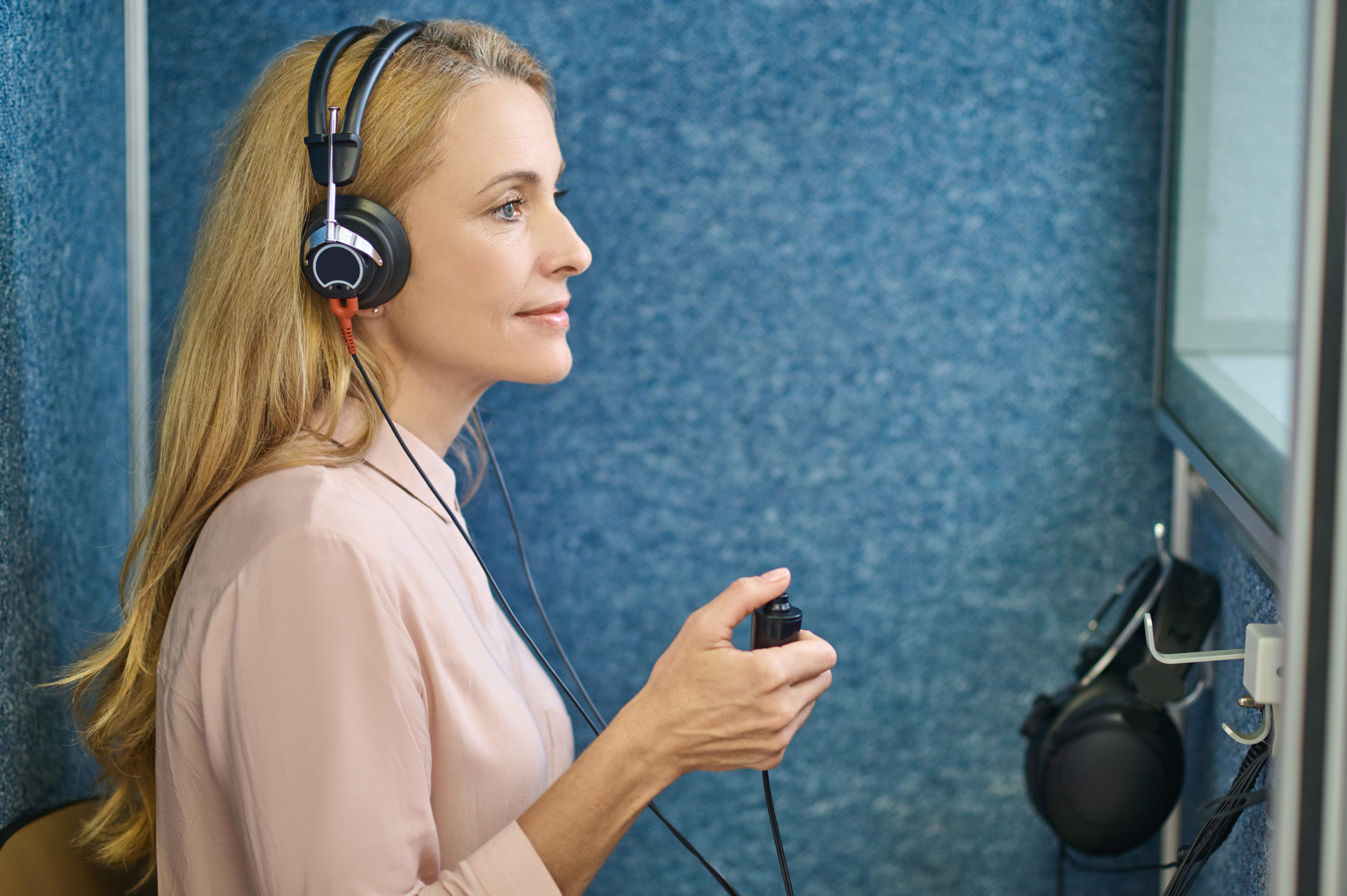Does the thought of going for a hearing test make your (cochlea) hair stand on end? We hope this article helps calm your nerves and allows you to better understand what to expect, how hearing tests work and how to know when you need one.
What is a hearing test?
A hearing test is a medical examination to measure how well a person can hear and determine their hearing capacity. A hearing test involves a series of procedures to measure a person’s ability to hear different sounds, pitches and volumes.
Hearing tests are used to diagnose hearing loss and its severity, and identify the type of hearing loss and can only be performed by an audiologist or hearing specialist.
How do hearing tests work?
How a hearing test works will depend on the type of hearing test you’ll be doing. Tests that use your feedback to determine when you hear a sound will record when you give feedback and chart it to determine whether you have hearing loss. Hearing tests that require the user to wear electrodes will pick up activity within the brain that indicates when sound is heard.
The different types of hearing tests
There are 5 types of hearing tests, and each test will have different procedures to measure different aspects of a person’s hearing. Here is a definition of each hearing test and how they work:
- Pure-tone hearing tests: During a pure-tone test, the individual wears headphones through which a series of tones are played at different frequencies and volumes. The person is asked to indicate when they can hear a sound. This test determines the faintest tones a person can hear at various frequencies, creating an audiogram that visualises their hearing ability.
- Speech testing: The individual is asked to repeat words or sentences spoken at different volumes. This can be done in a quiet environment or with background noise. Speech testing evaluates how well a person can hear and understand speech, whilst emulating an everyday environment, which is essential for effective communication.
- Auditory Brainstem Response (ABR) testing: Electrodes are placed on the scalp and earlobes to measure the brain’s response to sounds. ABR tests assess the hearing nerve and brain pathways for hearing and are especially useful for testing newborns and individuals who cannot participate in standard hearing tests.
- Otoacoustic Emissions (OAEs) testing: A small probe is placed in the ear canal, which emits sounds and measures the echo that returns from the inner ear. OAEs test the function of the outer hair cells in the cochlea. They are often used to screen newborns and check for hearing issues in individuals who have difficulty with standard tests.
- Tympanometry testing: A probe is inserted into the ear canal to change the air pressure, causing the eardrum to move and that movement is then measured. Tympanometry evaluates the condition of the middle ear, eardrum, and conduction bones by measuring their mobility and how they respond to changes in air pressure.
Why are hearing tests important?
Hearing tests are important for all ages and are the first step in determining hearing loss. Early detection, and with the right management, can help prevent further deterioration. Regular hearing tests are equally important to assess hearing health over time and to ensure the patient is always receiving the best care.
Hearing tests are also important as they are crucial for children and infants to develop proper speech and language skills, and meet other developmental milestones. Hearing loss management is also important in the elder years and hearing loss has been linked to dementia and can lead to isolation and cognitive decline.
What to expect when you go for a hearing test
Many people wonder what happens at a hearing test, and naturally so! Each hearing test clinic will have its own set of specific practices, but with The Hearing Specialist you can expect us to conduct a hearing test like so:
- An initial consultation. This includes a comprehensive medical history, including family history, medications and hearing-related issues, as well as a chat about your symptoms.
- Visual examination. For this, an audiologist will use an otoscope to look inside the ear canal to assess whether or not there are any obstructions such as earwax build up or signs of infection.
- The hearing test. How this is carried out will depend on which type of hearing test you’ll be having. Most of our hearing tests take place within a sound booth where you’ll sit in a comfortable booth and be asked to wear headphones. We’ll then carry out our pure-tone hearing test where you’ll indicate when you hear a sound through the headphones.
- Audiogram and results. Once the test is complete, we’ll have a visual representation of your hearing capacity on an audiogram. We’ll then decipher the results and share these with you, identifying any hearing loss, the severity of the impairment and how to manage this.
- Follow-ups. We recommend that those with hearing loss come for regular monitoring. How regular that is will depend on the severity of the hearing loss and we can discuss this at your appointment.

How do I know when I need a hearing test?
The rule of thumb is if you are experiencing difficulty hearing the television and you find yourself needing to turn it up louder than usual, or are having trouble following along in conversation in noisy environments, we recommend you come for a hearing test.
Other signs could be hearing a constant ringing in the ear, which is commonly known as tinnitus, as this can be a sign that there is a problem which can be managed with hearing aids.
Who can have a hearing test?
Hearing tests are available to people of all ages and abilities. Those who are concerned about their hearing capacity should see an audiologist for a hearing assessment before their hearing further declines.
People who are at risk of hearing loss, for example, those who work in noisy environments, those with a family history of hearing impairments or people on certain medications should be having their hearing assessed regularly.
Book for your hearing test
Hearing tests needn’t be daunting and scary, and neither should living with hearing loss. Our friendly and professional audiologists and hearing specialists are here to help you navigate your concerns and hearing problems, and find the right path for your hearing loss management. Book your appointment with us today and discover clearer hearing.

